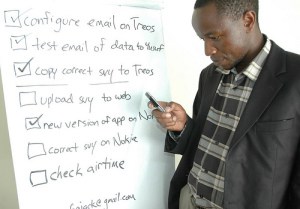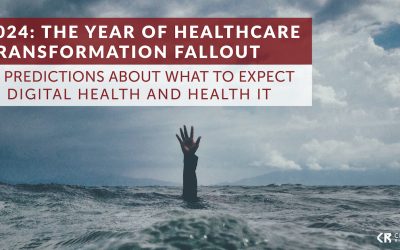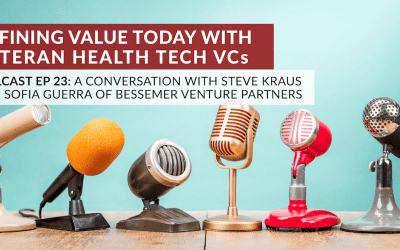
Key Take-Aways:
mHealth is clearly a top priority of the Obama Administration. Rare that an inaugural event would attract HHS Secretary Kathleen Sebelius as keynote speaker when so much is happening on the Hill regarding healthcare reform. In addition to the Secretary, day two had a keynote by US Ambassador Elizabeth Fawley Bagley. Brian Dolan of mobihealthnews.com did a nice write-up on the Secretary’s keynote.
mHealth initiatives in developing countries do not have a sustainable business model, all are grant funded. Big problem here as the researchers are not structuring their research to collect the data needed to justify the investment(s) and subsequently define sustainable business models for the mHealth technology they have deployed. Crazy! This is not basic research folks and those funding these initiatives need to be more diligent in reviewing proposals to insure that such data types (hard and soft savings metrics) are collected. (For a counter view on this issue read ICTworks post on the topic. FYI, ICTworks is part of inveceo, a small company formed out of Josh Nesbitt’s, who is a Stanford student, work in Africa. Josh gave one of th better presentations at this event, very inspiring.)
African countries want a platform that allows them to build mHealth apps that address the priorities they chose in a manner that reflects their culture. Consultants and pre-packaged, shrink-wrap solutions need not apply. (Note: OpenMRS appears to be gaining wide popularity in developing countries.)
Most mHealth efforts/research & roll-out, at least expressed at this event, are very narrowly focused on one disease state. Research has borne out time and again that the vast majority of those with a chronic condition and many with an episodic condition suffer from some other co-morbidity, particularly in the realm of mood disorders. More work is required to build out these mHealth apps to be still simple to use, but also multi-faceted to address whole health.
There are some really outstanding results in the use of mHealth. One of many examples presented: A public health texting service in South Africa addressing AIDs and TB awareness, encouraging those at risk to call public health clinic, resulted in call volume increase of over 300% to public health clinics that has not subsided.
Iterative user interface design is critical. Those deploying mHealth solutions in the field have found that designing the user interface (UI) is not trivial by any means (is it ever?) requiring an iterative process as one is dealing with very small real-estate inherent in mobile devices. End users often get icons wrong, mis-enter info, do not complete sections if too lengthy, etc. But even in designing that UI, take user inputs with a grain of salt as users often prefer UIs that they use incorrectly.
Mobile tech may well be the silver bullet to address healthcare disparities. While there has been a significant amount of attention/discussion on health disparities that may arise via Internet-based consumer-facing healthcare services, mHealth apps may provide a balance as both African-American and Hispanic communities in the US are far more heavier users of mobile tech than Caucasians.
This was a good event, but like any inaugural event, there are always a few bugs to work-out. Hopefully next year’s event (November 9-10) will more effectively address new technologies and modalities that will support mHealth initiatives (most tech on display here is re-purposed tech from 10yrs ago) and expand to include discussions on real outcomes, sustainable business models and consumer-facing mHealth apps with real consumers talking about their personal experiences.
As we’ve said many times in our writings:
Health is Mobile
Health does not occur when you are in front of your computer, it is a part of your every day life and actions. There is tremendous promise in mHealth apps but this market is still extremely young, nascent and immature. A lot of experimentation occurring today but in a 2-4 years this experimentation will convert into vibrant business models. Mobile apps will be the future of much of health, wellness, and care. Any company/software vendor worth their salt in the healthcare space better damn well have a mobile strategy on their white board or they may well become irrelevant.




Thanks for sharing your thoughts, John. Sorry we didn’t get to talk this week.
FYI – Inveneo and FrontlineSMS:Medic are separate entitites, they just share some synergies and partner together. Inveneo is an overall IT systems integrator for the global south, and FSMS is a specific mHealth app.
I think there’s a place for both basic and applied research in the ICT4D space, but it’s important for anyone to identify which they’re doing at the outset. Regardless of approach, they both need to have clear goals and focus on outcomes – which I agree was greatly lacking this week (save a few examples).
As for interface design, I’m in agreement with what little HCI research has taken place in this field that what can best be described as “progressive participatory design” may be the best design approach for these projects. However, I also believe that basic qualitative research is of great import – most people, going in to these projects, have little understanding of the cultures and paradigms in which they’re attempting to work. (My research at IU is focused on my latter statements.)
Cheers,
Michael Downey
Indiana University School of Informatics & OpenMRS Project
John,
As always, thank you for the consistently valuable analysis and perspectives you provide for those of us who were not able to attend these events. I am linking this post to the MedTech-IQ international network. I am sure the members will find it useful. Here is a link to our mHealth coverage to date: http://medtechiq.ning.com/main/search/search?q=mHealth&page=1
Enjoy,
CC
Thanks for pointing out our post, Why mHealth Should Not Be Sustainable but note that Inveneo and FrontlineSMS (Josh’s company) are quite independent of each other. We just collaborate to help users roll out SMS:Medic in rural areas through appropriate hardware to compliment their software.
Great summary of the topics covered at this year’s mHealth summit. It is great to hear that both companies and our government are placing a higher priority on developing more mHealth-focused applications for patients. At Globaltel Media we’ve adapted text message technology to aid patients in everything from appointment scheduling/reminders to rehabilitation support via mobile video, we’ve found the more access patients have to their personal health-realted information and activities, the more conncted they feel with their respective care providers.
I can’t add to what you have critically observed here. Maybe NIH’s narrow clinical organizational stance rather than wider public or global health one dictated the conference’s outlook and outcomes.